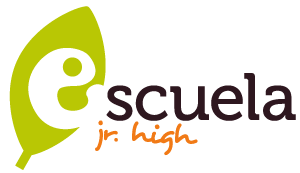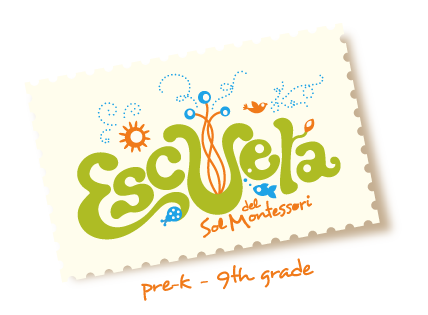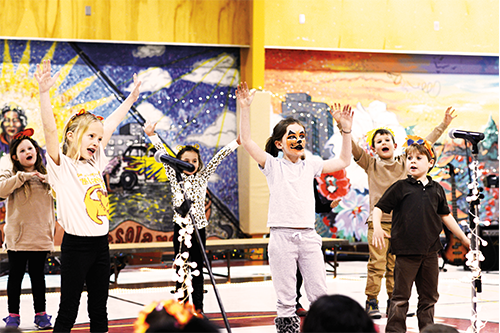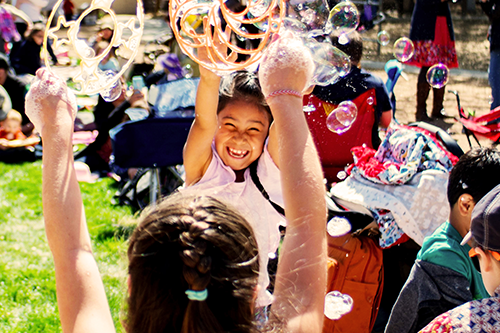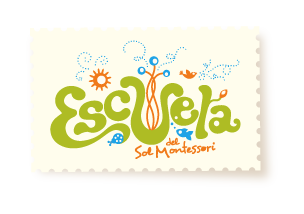Our circles keep everyone in the loop.

Alumni Night 2019
Preparation for Life: Alumni Night
By Sarah Louderbough, Elementary Level Director
When you imagine your child in high school, and even beyond, what are your hopes? What are important qualities and characteristics you hope they will possess?
A group of nine Escuela alumni representing seven different high schools, ranging from freshman to juniors, joined us for an unforgettable evening. Parents were able to glimpse some “products” of our toddler through Jr. High program.
Students talked about their transition from Montessori to more conventional schools, from a smaller community to a larger one. Homework and tests were discussed, as were social dynamics, problem solving, stress, and time management. Our alumni shared insights and appreciation about their current schools, as well as astute observations about differences they noticed about Montessori grads and their peers. And what really shined through was self-awareness and love of learning. “Inspired learning — it all started here!”
One of the students recognized how valuable it is “to want to do work, not because of grade, because you want to learn and do something you are going to be proud of.”
Below are some highlights and insights from the evening. And be sure to attend this very special event next year! Our 2020 panel will be composed of alumni parents, who offer a unique perspective.
When asked to share what they appreciate about their current school, across the board students talked about community. This included friends, but most importantly teachers who are passionate, inviting, accessible, and invested in student success. One interesting insight was a difference in the way Montessori students interact with their teachers — an ability to connect in a way that other students don’t.
“I wasn’t afraid to interact with adults and ask for help. I can look up to them and they can look up to me.”
Another student highlighted the importance not only of knowing what you need, but also of being able to effectively express this.
These ideas were revisited when students talked about transitioning to their next school. As this is a question on the minds of many Montessori parents, we’ll share more detail from student responses. Three primary components of the transition were touched on: work, logistics, and friendship.
Working With Ease
Several on our alumni panel expressed that the work was the easiest part of the transition. “I know more than so many of my classmates,” one student said. Another student echoed this sentiment, adding that she was excited for more homework: “I was like, give me more!” And another added that homework was different because it was more textbook based, “but I was able to manage because I knew how to be flexible and adapt. I figured it out.”
“It wasn’t as hard as I thought it would be. I felt prepared. And I was ready for a bigger school, even though it was a little overwhelming at first.”
“The transition was pretty easy. The community was great, and I know how to ask for help.”
“I talk so much, but I learned how to be quiet in class and not blurt out every thought I had.”
Several alumni talked about what it was like moving into a much larger school (from a class of 10 to 2,000 in one case), having many different teachers and rotating class schedules. Across the panel, students talked about being able to adapt, problem solve, and ask for help. “As long as you show respect, people are willing to help you.”
“My transition was pretty swift, academically and socially. I had some trouble getting from class to class because it’s different, but you roll with it.”
“The schedule was hard on the first day but you get used to it; you adapt. When you figure it all out you’re rolling!”
Finding Community
Thoughts shared about the social transition were quite interesting. Not every grade school and junior high focus on teaching strong communication and conflict resolution skills, and not every school upholds respect of self, others, and the environment as fundamental values. Cliques and other social groupings were new to some of our alumni when they entered high school. One student expressed surprise at friends’ lack of problem-solving skills. “Some of my friends now are totally clueless, but I am there to help them — here’s how you can solve this without being mean.” This same student expressed satisfaction with her ability to make new friends, “It’s been almost bewildering that I can make friends because there was a time that I didn’t believe that I could.”
“I had a hard time adapting to the social aspect, navigating different groups — where do I really belong? But I found where I belong.”
“I know who I am, so I could find a friend in every group.”
“As long as you find places you’re comfortable you can navigate difficulties. I was really nervous, but was able to connect and find support.”
“I found people I can consistently be close with. I don’t need to be friends with everyone.”
“I didn’t want to leave my friends at Escuela — I cried a lot at graduation — but having really close friends has enabled me to make better friends at my new school.”
“I had a rough first couple of days and then I said, woah – I’ve got to get over myself! And I found people who are actually good friends.”
For those of us who worry about peer pressure and negative social influences in adolescence, it was so reassuring to hear how strong and sensible our alumni are when it comes to understanding what it truly means to be a friend. As one student eloquently stated, “I really shouldn’t care too much about what other people think. I don’t need to conform to what other people want me to be. Just be nice — to others, to materials, and to yourself. This helped me to build a foundation of self-acceptance.”
Life Skills
In addition to adaptability and strong social skills, our alumni panel shared some other key skills and knowledge gained during their years at Escuela: time management, collaboration, self-care, cooking, – “I can make myself food in the morning and it doesn’t take forever.” One alum reflected on materials and the unconventional method — he remembers being unsure at the time because it was so different, “But now I can visualize concepts and quantities.”
“I know how to manage my stress. I can take a break and clear my head, and then start again.”
“What’s important? Valuing yourself and self-care; reminding yourself that you’re important. I’m doing great today — even though I have like five tests and so much homework, I’m fine!”
“I’m not afraid to make a mistake. I raise my hand and give it a go.”
“Brainstorming, planning, generating ideas — I have taken on managing a shop: branding, what we want to focus on producing… I don’t think I would have taken this on if I hadn’t gone to the Jr. High.”
“Finding inspiration, especially for more open ended projects. I have friends who are used to being told what to do. They have a harder time coming up with ideas.”
“How to work independently and be flexible; it’s not just about group projects. Some of my friends like group work because there will be someone in the group who will just do all the work. At Escuela, I learned how to push myself, and how to learn and think for myself.”
Test Taking – No Sweat!
When asked about test-taking, one of our panelists shared surprisingly simple insights and excellent advice:
“I like taking tests — I loved the PSAT — I had no idea what would be on it. It was like a fun experiment.”
“I was so nervous because I had heard bad things about tests, but it wasn’t as bad as I thought. Pay attention and get prepared and you’ll be fine. It’s not a big deal.”
“I don’t mind them. I don’t know why there is so much build up about tests.”
“Sometimes, I feel the pressure to get 100% because… I don’t know why. But if you do your best and study that’s what really matters.”
“Techniques to remember key terms, like mnemonics and other memory tools can be helpful.”
“I have always struggled with timed tests, but striking a “power pose” beforehand really helped!”
It is really quite amazing how much ground we covered in a gathering that lasted less than 90 minutes. And while we loved it all, our hearts soared when students talked about some of the areas where they feel particularly successful. One student started by saying, “I feel successful in the conventional sense — I get good grades and stuff — but what is really important is that I learned to love and accept myself. I am now more comfortable with change and can embrace it. And more successful in the way that I am always trying to be more kind.”
Keys to Success
Alumni pinpointed important components of academic success: being inspired to learn new things, not being afraid to ask questions, being able to have good relationships with teachers, and how to ask for help and get the support needed to excel. One student pointed out that even if you’re unfamiliar with the topic, “you should go for it with all that passion. You might not get the exact result you wanted, but you’ll get really close.”
“I enjoy going to school. I enjoy learning new things. I enjoy being part of a soccer team. I am able to spend time with people who are most important to me.”
“I am specifically excelling at math, which is awesome because I really struggled with fractions, but things like test-tube division are so helpful now. I have this understanding and ability to do things in my head.”
“Yeah, I’m doing well academically. But I really feel successful knowing how to be a strong player for a team. It’s like another family.”
“I’m doing really great in English. I have grown to realize that I am a really good writer!”
“I really love project-based work, especially projects that take more motivation and research to do. Sometimes I get too passionate about projects and put too much time into projects, but that’s not so bad.”
You’re still with us – hooray! We know this is a bit long; there is just so much to share that we know you’ll find interesting and valuable. Two of our final questions for alumni addressed core life skills that are very much related to eachother: creative problem solving and working with diverse groups of people. “Innovative thinking was part of everything we did at Escuela. Now I’m able to help people around me, even my teachers, see different perspectives and see things in a new light.”
Problem Solving & Conflict Resolution
Several alumni talked about having a broad point of view and being able to look at things from many different angles. Other key themes were valuing different perspectives, hearing people out and finding common ground, and knowing that if you try your best you’ll be appreciated. Above all, when you have problems with people, remember that they’re just people and we all mess up. “Approach the mess with kindness.”
“I’m able to look at problems in a way that is not so temporary.”
“I know that others are sometimes shy and can’t speak what they really think.”
“It’s really important to be able to listen without being offended, or holding it against them.”
In high school, different kinds of problems come up, but you use the skills you have to try and tackle the new problem.
“For one difficult project, I reluctantly took on a leadership role. But I took into account how other people might view the problem to help the group reach a conclusion.”
Respecting Others
When considering experiences working with different groups of people, some students thought about service learning, both at Escuela and in their high school. “Through service learning, community learning, and Going Out, I learned how to interact with many people openly.” Alumni also recognized how working with a variety of people, both in school and out in the wider world, helped them to develop communication and problem-solving skills.
“Even if I don’t agree with someone, their thoughts are valid for them. They might think I’m crazy — it goes both ways.”
“Imagining how people think helps me appreciate other perspectives.”
“If you have respect – this is most important. It doesn’t always have to be your way.”
“You don’t have to be friends to appreciate the person for who they are.”
“Experiences at Escuela taught me about interactions more than focusing on how that person got there.”
“My school is very diverse and I am able to work with all different kinds of people. You change with them and they change with you also.”
In the Future…
The last question asked the alumni to look ahead and share what might be on their horizon. Here are a few of the responses:
“I’m discovering my interest in law enforcement and other social structures. I’m not sure where this will lead.”
“I’d like to pursue graphic design – a new interest.”
“Ever since I met Ann Taylor (professional architect who works periodically with the Jr. High), I have been so interested in architecture. I am going to study Art and Architecture in LA for Winterim this year. And I’m very interested in the Rochester School of Architecture.”
“Immigration law.”
“Maybe studying astronomy in Kenya.”
“I really love history and I’d like to find a way to integrate it into law. I don’t know exactly what that will be.”
As you might have noticed, Escuela alumni are articulate, thoughtful and ambitious. They have used the foundation of advanced academics, creativity, problem solving and social acceptance they built during their time at Escuela as a springboard to launch into the world beyond our walls and SOAR.
